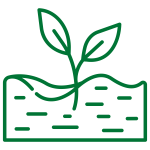These pages offer resources for home and community gardeners along with others who are concerned about chemical contaminants in their soil. Here, you can learn to identify, understand, and manage risks associated with soil contaminants.

Explore the following pages for general information about soil contaminants, and what you can do to help limit exposure and health risks.
What are soil contaminants and where do they come from?
Soil contaminants are naturally occurring or human-made chemicals in soil that can have a negative impact on human and/or environmental health. Exposure can occur through direct skin contact with the soil, breathing in or ingesting soil particles, or by eating contaminated produce. Industrial land use, lead paint use, traffic pollution, runoff, and several other sources can introduce contaminants into nearby soils. Some contaminants can last in soils for many years after they are introduced. Learn more
How can I reduce my exposure?
Unless your soil is heavily contaminated and requires clean-up, there are easy steps that can be taken to minimize exposure to lower levels of soil contaminants. Learn more
How are we exposed and what are some related health risks?
Low levels of contaminants in soils do not usually present an immediate risk to human health. But some contaminants can build up in a person’s body over time can impact health, especially for children and other more vulnerable groups. In most cases, the benefits of gardening and growing your own food far outweigh the risks from soil contaminants. Learn more
What about testing my soil?
Typical soil nutrient testing (like the testing services offered by NCSU Cooperative Extension) do not include any tests for possible soil contaminants like heavy metals. Our gardener decision tool can help you understand your relative exposure risks and whether additional testing for soil contaminants may be necessary. Learn more
Our partner NC Cooperative Extension Gardener Program now hosts our garden soils resources on their website! Visit NC Cooperative Extension Gardener Program for the most up to date information on soil contamination.


